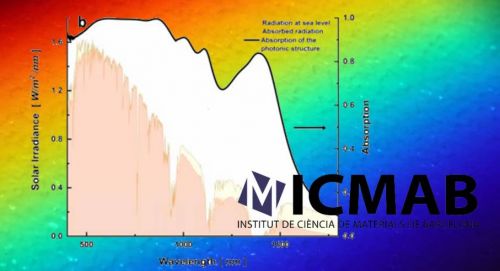
15/02/2018
ICMAB traps sunlight with superabsorbent nanomaterials
ICMAB traps sunlight with superabsorbent nanomaterials
In renewable energies, increasing efficiency is a key challenge in the production of “photovoltaic” electrons. This includes elaborating materials that can absorb the largest possible sunlight spectrum.
Great news from the Institute of Materials Science of Barcelona (ICMAB), a Barcelona Synchrotron Park’s partner: researchers led by Dr. Agustín Mihi, have created materials that largely absorb a wide range of the solar spectrum, between 400 and 1500 nm (visible light and infrared radiations), using an ultrathin layer of less than 100 nm thick of material.
The followed strategy, low cost and fully scalable, is based on combining the thin layer deposition of semiconductors on metals, and the nanostructuring of the material forming photonic crystals. The obtained superabsorbers materials have many potential applications, especially in the field of photovoltaic energy and photodetection.
Moreover, the researchers provide, in the study published in Advanced Materials, the design guidelines to synthesize other types of materials following the same strategy.
Great news from the Institute of Materials Science of Barcelona (ICMAB), a Barcelona Synchrotron Park’s partner: researchers led by Dr. Agustín Mihi, have created materials that largely absorb a wide range of the solar spectrum, between 400 and 1500 nm (visible light and infrared radiations), using an ultrathin layer of less than 100 nm thick of material.
The followed strategy, low cost and fully scalable, is based on combining the thin layer deposition of semiconductors on metals, and the nanostructuring of the material forming photonic crystals. The obtained superabsorbers materials have many potential applications, especially in the field of photovoltaic energy and photodetection.
Moreover, the researchers provide, in the study published in Advanced Materials, the design guidelines to synthesize other types of materials following the same strategy.
More news
10/11/2015
Natura Bissé in the Barcelona Synchrotron Park
05/11/2015
Two Research Centers Awarded at the UAB University
28/10/2015
How ideas grow, the new Barcelona Synchrotron Park video
20/10/2015
Welcome to Barcelona
08/10/2015
Good News for Two PRUAB Spin-Offs
30/09/2015
BSC-CNS Director, Prof. Valero, Recipient of the Seymour Cray Computer Engineering Award









